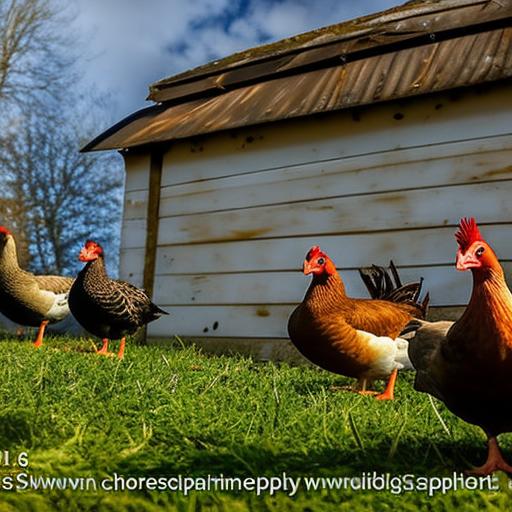Raising geese and chickens has become increasingly popular among individuals who are looking to become more self-sufficient and sustainable. These birds offer a wide range of benefits, from providing fresh eggs and meat to controlling pests and producing fertilizer. In this article, we will explore the many advantages of keeping geese and chickens, as well as provide tips and advice on how to successfully raise and care for these birds.
Key Takeaways
- Keeping geese and chickens can provide numerous benefits, including fresh eggs, meat, pest control, and fertilizer.
- Choosing the right breeds for your flock is important, as different breeds have different characteristics and needs.
- Creating a comfortable and safe living environment for your birds is crucial for their health and well-being.
- Proper feeding and watering practices are essential for maintaining the health of your geese and chickens.
- Regular health checks and preventative measures can help protect your flock from predators and disease.
The Benefits of Keeping Geese and Chickens
One of the main benefits of raising geese and chickens is the abundance of fresh eggs and meat that they provide. Not only are these eggs and meat more nutritious than store-bought alternatives, but they also offer a superior taste. Additionally, by raising your own birds, you have control over their diet and living conditions, ensuring that they are raised in a healthy and humane manner.
Another advantage of keeping geese and chickens is their ability to control pests. These birds are natural foragers and will happily eat insects, slugs, and other pests that can damage your garden or crops. By allowing your birds to roam freely in your yard or garden, you can significantly reduce the need for chemical pesticides.
Furthermore, geese and chickens produce high-quality fertilizer in the form of manure. This manure is rich in nutrients and can be used to fertilize your garden or compost pile. By utilizing this natural fertilizer, you can improve the health and productivity of your plants while reducing the need for synthetic fertilizers.
Choosing the Right Breeds for Your Flock
When it comes to choosing the right breeds for your flock, it is important to consider your specific needs and environment. Different breeds have different characteristics, such as egg-laying ability, meat production, temperament, and cold or heat tolerance.
For those primarily interested in egg production, popular chicken breeds include Rhode Island Reds, Leghorns, and Australorps. These breeds are known for their high egg-laying capacity and can produce a consistent supply of eggs throughout the year. If you are looking for dual-purpose breeds that can provide both eggs and meat, consider breeds such as Plymouth Rocks, Sussex, or Orpingtons.
When it comes to geese, popular breeds include Toulouse, Embden, and Chinese geese. Toulouse geese are known for their large size and excellent meat production, while Embden geese are prized for their white feathers and high egg-laying capacity. Chinese geese are smaller in size but are known for their friendly temperament and ability to lay a good number of eggs.
Creating the Perfect Living Environment for Your Birds
Creating a comfortable and safe living environment is crucial for the health and well-being of your geese and chickens. The first step is to provide them with a suitable coop and run. The coop should be well-ventilated, predator-proof, and provide enough space for your birds to roost and lay eggs. The run should be securely fenced to prevent predators from entering and should offer plenty of space for your birds to roam and forage.
It is also important to provide your birds with appropriate bedding material in the coop. Straw or wood shavings make excellent choices as they provide insulation, absorb moisture, and are easy to clean. Regular cleaning of the coop is essential to prevent the buildup of bacteria and parasites.
In addition to a suitable living space, your birds will also need access to fresh water and a balanced diet. Ensure that they have access to clean water at all times, either through a water dispenser or by providing shallow dishes that are easy for them to drink from. As for their diet, geese and chickens require a combination of grains, vegetables, fruits, and protein sources such as insects or commercial feed. Consult with a poultry nutritionist or veterinarian to ensure that your birds are receiving the proper nutrients for their specific needs.
Feeding and Watering Your Geese and Chickens
Feeding and watering your geese and chickens properly is essential for their health and productivity. These birds have specific nutritional needs that must be met in order for them to thrive.
A balanced diet for geese and chickens should consist of a combination of grains, vegetables, fruits, and protein sources. Grains such as corn, wheat, and barley can make up the bulk of their diet, while vegetables and fruits provide essential vitamins and minerals. Protein sources can include insects, worms, or commercial feed that is specifically formulated for poultry.
It is important to provide your birds with fresh water at all times. Water is essential for digestion, egg production, and overall health. Ensure that the water is clean and easily accessible to your birds. Regularly clean and refill their water containers to prevent the buildup of bacteria or algae.
Health and Wellness: Caring for Your Flock

Caring for the health and wellness of your flock is crucial to their overall well-being. Like any other animal, geese and chickens are susceptible to a variety of health issues that can impact their productivity and quality of life.
Common health issues in geese and chickens include respiratory infections, parasites, nutritional deficiencies, and injuries. It is important to monitor your birds regularly for any signs of illness or distress. If you notice any abnormal behavior or symptoms such as coughing, sneezing, lethargy, or changes in appetite, it is important to seek veterinary care immediately.
Prevention is key when it comes to maintaining the health of your flock. Provide them with a clean living environment, regular access to fresh water, a balanced diet, and proper ventilation. Regularly inspect your birds for signs of parasites such as mites or lice, and take appropriate measures to control them if necessary.
Egg Production: Maximizing Your Yield
If you are raising geese and chickens for their eggs, there are several steps you can take to maximize your yield. First and foremost, ensure that your birds have access to a balanced diet that is rich in calcium. Calcium is essential for the production of strong eggshells, so it is important to provide your birds with a source of calcium such as crushed oyster shells or eggshells.
In addition to a balanced diet, providing your birds with a comfortable and stress-free environment can also encourage egg production. Ensure that they have enough space in their coop and run, as overcrowding can lead to stress and reduced egg production. Provide them with nesting boxes that are dark, quiet, and filled with soft bedding material.
Collecting and storing eggs properly is also important for maintaining their freshness and quality. Collect eggs daily to prevent them from becoming dirty or damaged. Store them in a cool and dry place, preferably in a refrigerator, with the pointed end facing downwards to help maintain their freshness.
Protecting Your Birds from Predators and Disease
Protecting your geese and chickens from predators and disease is essential for their safety and well-being. Common predators include raccoons, foxes, coyotes, dogs, cats, and birds of prey. To protect your birds from these predators, ensure that their coop and run are securely fenced with wire mesh that is buried at least 12 inches into the ground to prevent digging.
Regularly inspect the perimeter of the coop and run for any signs of damage or potential entry points. Repair any holes or weak spots immediately to prevent predators from gaining access. Consider installing motion-activated lights or alarms to deter nocturnal predators.
Disease prevention is equally important when it comes to protecting your flock. Keep your birds’ living environment clean and free from feces or other sources of contamination. Quarantine new birds before introducing them to your existing flock to prevent the spread of diseases. Consult with a veterinarian to develop a vaccination and deworming schedule for your birds.
Handling and Managing Your Birds
Proper handling and management of your geese and chickens is important for their safety and well-being. Regular handling can help to socialize your birds and make them more comfortable around humans.
When handling your birds, it is important to be gentle and calm. Approach them slowly and avoid making sudden movements or loud noises that may startle them. Use both hands to support their body when picking them up, and avoid grabbing them by their wings or legs.
Regularly inspect your birds for any signs of injury or illness. Check their feathers, eyes, beak, feet, and vent for any abnormalities. Trim their wings if necessary to prevent them from flying over fences or escaping from their enclosure. Beak trimming may also be necessary to prevent aggressive behavior or feather picking.
Selling Eggs and Meat: A Guide to Profitability
If you are interested in selling eggs and meat from your geese and chickens, there are several steps you can take to ensure profitability. First and foremost, ensure that you are following all local regulations and requirements for selling poultry products. This may include obtaining the necessary permits or licenses, as well as adhering to food safety guidelines.
Marketing your products effectively is also crucial for success. Consider selling your eggs and meat at local farmers markets, through a community-supported agriculture (CSA) program, or directly to local restaurants or grocery stores. Develop a brand identity for your products and create attractive packaging that highlights the quality and freshness of your poultry.
Building relationships with your customers is also important for repeat business. Provide excellent customer service, offer samples of your products, and educate your customers about the benefits of buying locally-raised poultry. Consider offering additional products such as poultry feed or bedding material to increase your revenue.
Sustainable Farming Practices: Raising Geese and Chickens for the Future
Raising geese and chickens in a sustainable and environmentally-friendly manner is not only beneficial for the birds themselves, but also for the planet. By implementing sustainable farming practices, you can reduce your environmental impact and contribute to a healthier and more sustainable food system.
One of the key principles of sustainable farming is to minimize waste. Compost any leftover food or vegetable scraps to reduce landfill waste and create nutrient-rich compost for your garden. Consider using rainwater collection systems to water your birds and garden, reducing your reliance on municipal water sources.
Another important aspect of sustainable farming is biodiversity. Encourage biodiversity in your yard or garden by planting a variety of native plants that provide food and habitat for birds, insects, and other wildlife. This will not only benefit your geese and chickens but also contribute to a healthier ecosystem.
Finally, consider implementing regenerative farming practices such as rotational grazing or pasture management. This involves moving your birds to different areas of your property on a regular basis, allowing the land to rest and regenerate. This can help improve soil health, reduce erosion, and increase carbon sequestration.
Raising geese and chickens can be a rewarding and fulfilling experience. Not only do these birds provide fresh eggs and meat, but they also offer pest control, fertilizer production, and the opportunity to connect with nature. By choosing the right breeds, creating a suitable living environment, providing proper nutrition and care, protecting them from predators and disease, and implementing sustainable farming practices, you can ensure the health and well-being of your flock while enjoying the many benefits they provide. So why wait? Start raising geese and chickens today!
If you’re interested in keeping geese and chickens, you may also find this article on turning a shed into a chicken coop from Poultry Wizard quite helpful. It provides valuable insights and practical tips on how to transform a shed into a suitable living space for your feathered friends. From choosing the right materials to ensuring proper ventilation and security, this article covers all the essential aspects of creating a cozy and functional coop. Check it out here for expert advice on making the most of your shed for your geese and chickens.
FAQs
What are the benefits of keeping geese and chickens?
Keeping geese and chickens can provide a source of fresh eggs and meat, as well as natural pest control for gardens and yards. They can also be enjoyable pets and provide fertilizer for gardens.
What are the basic requirements for keeping geese and chickens?
Geese and chickens require a secure coop or shelter to protect them from predators, access to fresh water and food, and a safe outdoor area to roam and forage. They also require regular care and maintenance, such as cleaning their coop and providing proper nutrition.
Can geese and chickens be kept together?
Yes, geese and chickens can be kept together as long as they have enough space and resources. However, it is important to monitor their interactions and ensure that the geese do not become aggressive towards the chickens.
What should be included in a geese and chicken’s diet?
A geese and chicken’s diet should consist of a balanced feed that includes grains, protein, and vitamins. They also require access to fresh water and may benefit from occasional treats such as fruits and vegetables.
What are some common health issues that geese and chickens may face?
Geese and chickens may face health issues such as respiratory infections, parasites, and injuries from predators or other birds. It is important to monitor their health and seek veterinary care if necessary.
What are some tips for keeping geese and chickens happy and healthy?
To keep geese and chickens happy and healthy, provide them with a clean and secure living environment, access to fresh water and food, and opportunities to forage and exercise. It is also important to monitor their health and behavior and seek veterinary care if necessary.
Meet Walter, the feathered-friend fanatic of Florida! Nestled in the sunshine state, Walter struts through life with his feathered companions, clucking his way to happiness. With a coop that’s fancier than a five-star hotel, he’s the Don Juan of the chicken world. When he’s not teaching his hens to do the cha-cha, you’ll find him in a heated debate with his prized rooster, Sir Clucks-a-Lot. Walter’s poultry passion is no yolk; he’s the sunny-side-up guy you never knew you needed in your flock of friends!







